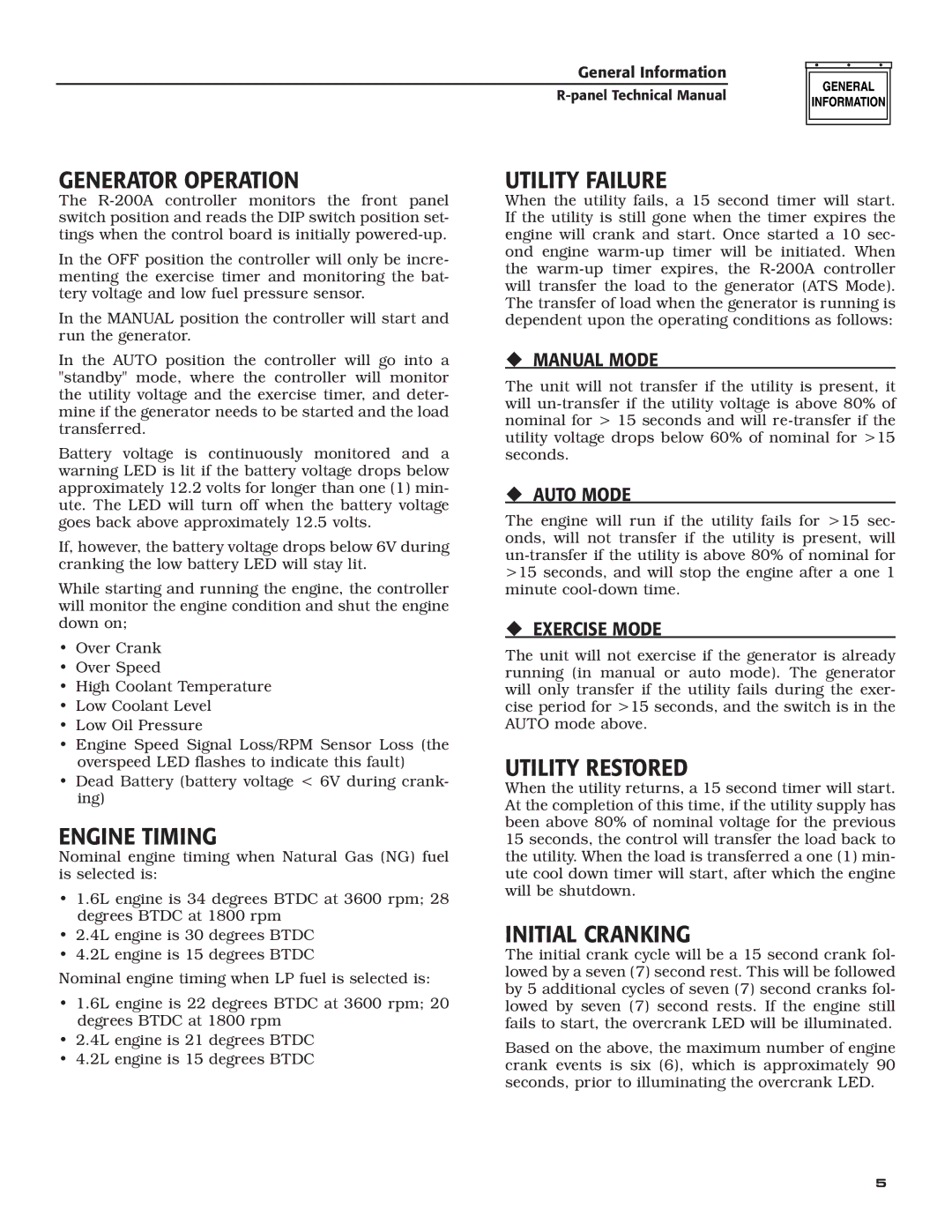
General Information
GENERATOR OPERATION
The
In the OFF position the controller will only be incre- menting the exercise timer and monitoring the bat- tery voltage and low fuel pressure sensor.
In the MANUAL position the controller will start and run the generator.
In the AUTO position the controller will go into a "standby" mode, where the controller will monitor the utility voltage and the exercise timer, and deter- mine if the generator needs to be started and the load transferred.
Battery voltage is continuously monitored and a warning LED is lit if the battery voltage drops below approximately 12.2 volts for longer than one (1) min- ute. The LED will turn off when the battery voltage goes back above approximately 12.5 volts.
If, however, the battery voltage drops below 6V during cranking the low battery LED will stay lit.
While starting and running the engine, the controller will monitor the engine condition and shut the engine down on;
•Over Crank
•Over Speed
•High Coolant Temperature
•Low Coolant Level
•Low Oil Pressure
•Engine Speed Signal Loss/RPM Sensor Loss (the overspeed LED flashes to indicate this fault)
•Dead Battery (battery voltage < 6V during crank- ing)
ENGINE TIMING
Nominal engine timing when Natural Gas (NG) fuel is selected is:
•1.6L engine is 34 degrees BTDC at 3600 rpm; 28 degrees BTDC at 1800 rpm
•2.4L engine is 30 degrees BTDC
•4.2L engine is 15 degrees BTDC
Nominal engine timing when LP fuel is selected is:
•1.6L engine is 22 degrees BTDC at 3600 rpm; 20 degrees BTDC at 1800 rpm
•2.4L engine is 21 degrees BTDC
•4.2L engine is 15 degrees BTDC
UTILITY FAILURE
When the utility fails, a 15 second timer will start. If the utility is still gone when the timer expires the engine will crank and start. Once started a 10 sec- ond engine
MANUAL MODE
The unit will not transfer if the utility is present, it will
AUTO MODE
The engine will run if the utility fails for >15 sec- onds, will not transfer if the utility is present, will
EXERCISE MODE
The unit will not exercise if the generator is already running (in manual or auto mode). The generator will only transfer if the utility fails during the exer- cise period for >15 seconds, and the switch is in the AUTO mode above.
UTILITY RESTORED
When the utility returns, a 15 second timer will start. At the completion of this time, if the utility supply has been above 80% of nominal voltage for the previous 15 seconds, the control will transfer the load back to the utility. When the load is transferred a one (1) min- ute cool down timer will start, after which the engine will be shutdown.
INITIAL CRANKING
The initial crank cycle will be a 15 second crank fol- lowed by a seven (7) second rest. This will be followed by 5 additional cycles of seven (7) second cranks fol- lowed by seven (7) second rests. If the engine still fails to start, the overcrank LED will be illuminated.
Based on the above, the maximum number of engine crank events is six (6), which is approximately 90 seconds, prior to illuminating the overcrank LED.
5
